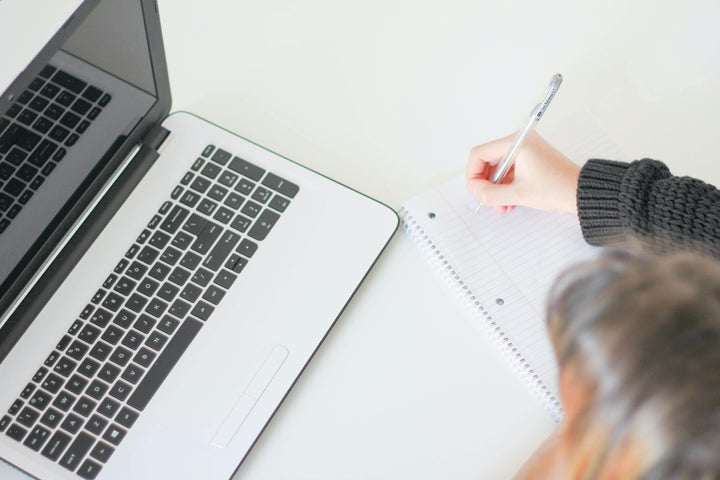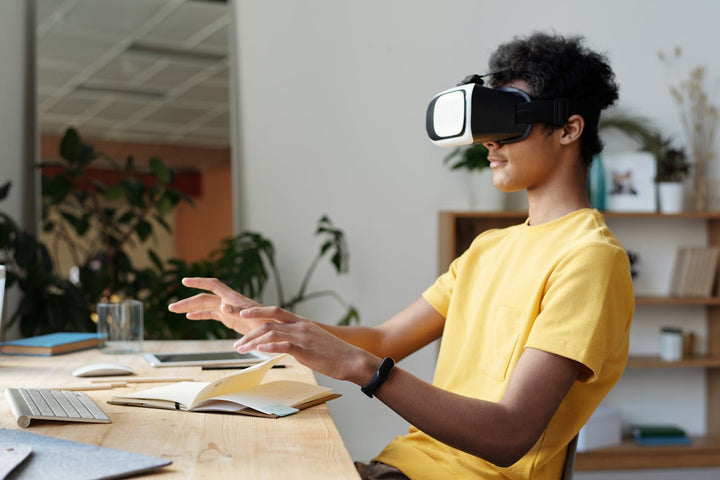The Guac brings you another Q&A with one of our talented Avocademy graduates! For this spotlight, we spoke with Carlotta Granholm to learn about her experience pivoting her career from freight sales to UX design.
Carlotta joined the Avocademy UX/UI Foundations program in late May 2021. By August, she had a stellar portfolio and felt ready to apply for jobs. After only a few weeks of job searching and many exciting interviews, she landed a perfect-match remote role at Mastery Logistics Systems.
Read our conversation below to learn all about Carlotta’s exciting UX career journey!
Q: Tell me about yourself. Where do you currently work?
A: I’m a longtime freight sales rep turned UX Designer. I work for Mastery Logistics Systems as the sole UX Designer, and my team consists of 3 product designers, a product manager, and myself. A lot of the people within the company have a really good understanding of UX; it’s a great team.
Q: I'm curious to hear a little bit more about your background in transportation logistics. What are freight sales?
A: I worked in operations for a few years before transitioning into freight sales. From loading trucks and planes to customs paperwork to arranging transportation for customers, I've done it all. I was in freight sales at a brokerage, I found trucks to move shipments for customers.
Q: What led you to pursue a career in UX? How did your previous work/educational experiences lead you here?
Leading up to the pandemic, I was starting to feel burnt out in sales. The pandemic reinforced the unrealistic expectations that can come with a sales job, like having vacation time but feeling like you can’t use it, micromanaging, and loss of excitement. I felt kind of like a zombie.
So I started looking into other opportunities. I wanted flexibility and the ability to remain remote, as I was working remotely before. I also wanted less stress and a job that let me be creative and also solve problems.
After I completed Avocademy and Career Jumpstart, I started applying to jobs, and I saw that my current company had posted an opening. They were building a transportation management system, or TMS, which is something I had used throughout my career. A TMS essentially helps you build loads and post them for truck drivers, as well as send documents.
As soon as I saw the posting, I was like, “this is the job for me. It's going to let me get my foot in the door as a UX designer. I have experience with TMS, and I'll know what I'm talking about on the logistics side.” I thought I could really advocate for the users because TMS systems can be terrible!
Q: What are you working on now? What’s a TMS system?
A: You know when you set up a hair appointment at a salon? A customer calls the salon, they open their software and book the appointment with the stylist, and then you get a text or email with the details and the stylist now has that customer on their schedule. A TMS lets you set up appointments for trucks the same way.
A TMS lets you send over documents, plan out the shipments and the loads. There’s a lot that you have to cover. You have to know things like what kind of truck needs to be there or how many hours the driver has left to drive that day. It's super detailed.
Q: What’s your favorite part of your work?
A: Honestly, the best part of my work is the culture. The people are amazing. Tech has this entirely different atmosphere than I am used to. A lot of the people I work with come from a background in logistics, and everybody's very like-minded and accepting. My company is very generous with employees, and they donate to St. Jude every year, too.
I think my favorite thing that I've worked on so far was sitting with users and seeing how they're using the product. Ultimately, that's going to drive design. So hearing their frustrations and seeing what they like was exciting.
Q: What’s the most challenging part of your work?
A: Getting acquainted with the product was really hard, and it’s still something that I'm doing. I’m working to figure out what's already been done, what improvements can be made, and what's realistic within engineering constraints.
There’s also the challenge of directing your energy when advocating for the user.
So if I'm going to bring something to the table, I need to have data to back it up when there’s pushback about a design choice.
Q: Now that you have broken into UX/UI, what are your new career goals? How are you learning and growing?
A: My main goal is to absorb as much knowledge from the people surrounding me. I also have so many people posting these really great articles to learn from that I would never find on my own.
As for career goals, I haven’t given it much thought yet. It would be nice to have an entire team under me one day. I’d love to work on a product that is trying to make the world a better place, maybe for a nonprofit. I would love to work on something that helps people who have a disability or just any humanitarian project.
Q: Tell me about your interview process. How long did it take to find the role you’re in now?
From start to finish it took about three weeks. It was a smooth process, but I had a ton of nerves.
Maca supported me throughout the whole process. She was amazing!
Q: Do you have a college degree?
A: I attended college for a few years before I decided to step away. I don't think I was prepared socially or emotionally to make such a huge decision like college and all that comes with it at the age of 18.
Q: Did your educational background impact your job search?
A: I don't feel like my lack of a degree impaired my ability to get a job in design. It had never been something that stopped me from achieving career goals in the past and I was not going to let it stop me in my transition.
Q: What would you say to other people interested in UX who haven't attended college before?
A: If you want to pursue UX but don't have a degree, don't let that stop you. I think a lot of people assume that a college degree is a golden ticket to landing a job, and while that is true for some fields and it definitely can help, it is not the only way to be appealing to potential employers. Lean into your life experiences and soft skills, and educate yourself using other sources (like Avocademy!). Not to sound cliché, but I think it is important to note that college isn't for everyone. Aside from it being a major financial decision, it isn't the most accessible form of education for many people— bootcamps are a great alternative.
Q: Why does UX appeal to you?
A: I like to think about problems, and I was already doing that before I did the bootcamp. I sometimes lay in bed at night and think, “how can I make this better?” I love to have that “aha!” moment two weeks later when I figure out a solution to something. I also like to work in Figma and just mess around with things.
I think when I was little, one of the many things that I wanted to be was an inventor. I like creating things, and I just think UX is cool.
Q: What advice do you have for newcomers/learners in the world of UX/UI?
A: Believe in yourself! Don’t get caught up in your head. Try it, and if it doesn’t work you can go back to the drawing board.
Not everyone is going to like your stuff, but you can’t take it personally, otherwise, you won’t get anywhere. Keep learning.
Also, find a team that can provide constructive feedback while also making you feel good about what you created and positive about making changes. A team like that is so valuable.
Q: How did Maca and Avocademy support your UX journey?
A: Maca, the mentors, and the connections I’ve made through Career Jumpstart projects have all played a huge role in my success transitioning into UX. Maca has been incredible. From our first call in May discussing if UX might be a good fit, until now, Maca has been a great mentor. She stuck with me to the end. I’ll be forever grateful.
Interview has been edited for length and clarity



